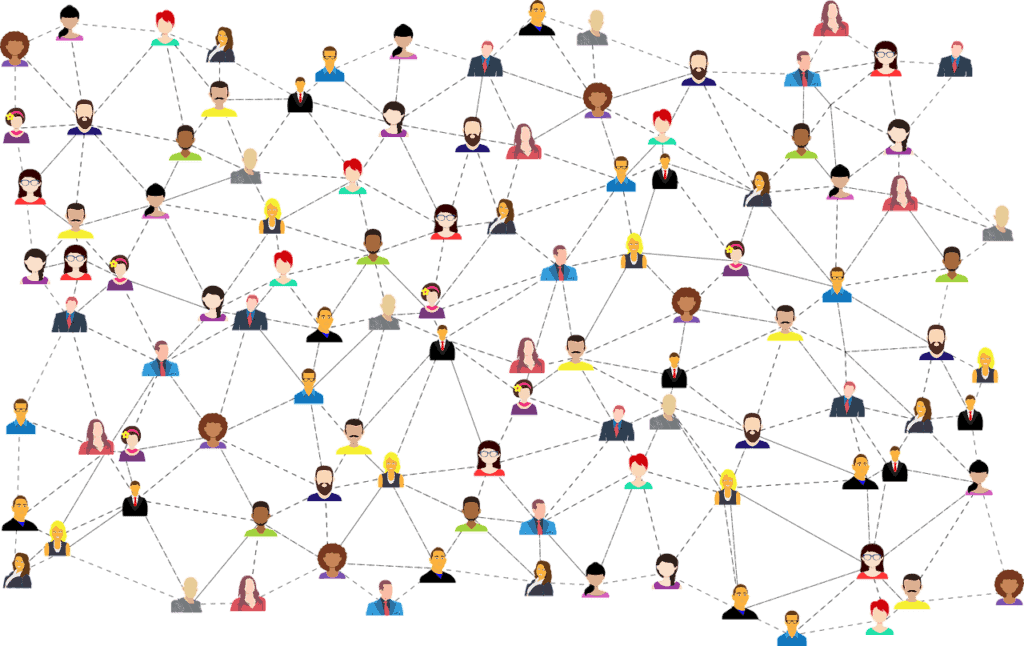
Children With Wider Social Circles Earn Higher Salaries
Whilst many parents will be eager for their child to obtain good GCSE results this summer, research suggests that a too narrow focus on exam performance may not be the best way to ensure a student’s success once they leave school. Increasingly, social skills are being recognised as major determinants of economic outcomes, and more consideration is being given to the relationship between personality and psychological characteristics on individual earnings and occupation choices.
A study by Doltone and Barbone (2014) found that the size of a student’s social network during secondary school has an effect on earnings in adulthood. The study used data collected on relationships between students, comparing the effects of both the social network size and the influence of the individual student within their network. The findings highlighted the impact that being a ‘key player’ had on the development of key social skills that influenced financial remuneration in employment. The family and school characteristics contribute towards the development of relational abilities, with enhancement taking place through various systems that reward certain behaviours (Bowles, Gintis & Osborne, 2001). Having the ability to connect with other key players within a social network from a young age is a learning process that an adult will find very useful in the workplace.
Speaking Out
Doltone and Barbone (2014) have suggested that the findings have social policy implications in that young people who are less well off may have more chances to improve their economic situation if they develop strong social skills when young. The idea is not a new one, The Joseph Rowntree Foundation (2013) published a report examining the ways that individuals utilise social networks to cope with or escape from poverty. It found that many individuals did not consider their own networks or strategies for building connections with other people, and that developing awareness and confidence in what they could offer other people was fundamental in growing an individual’s network further. Those individuals who had already reflected on their networking ability saw the importance of having a wider range of connections and understood how it offered greater employment prospects. There was also a sense that social networks could help those at the margins of society to access information that helped them to negotiate complex systems such as benefits, health services and education. Contacts could also highlight potential job opportunities to those in need of employment. Young people especially can benefit from this practice.
Personality Can Change
Interestingly, some studies have suggested that personality traits are actually more malleable than academic ability (Borghans, Duckworth & Heckman, 2008), and therefore respond more successfully to parental and school encouragement. Cognitive processing speed has been shown to rise dramatically during childhood, peak in late adolescence, and then gradually decrease. In comparison, some personality traits, such as conscientiousness, are shown to develop continuously from childhood onwards and can be directed strongly by outside influences. Traits such as conscientiousness are correlated with emotional stability (control and self esteem), and unlike IQ do not vary with job complexity (Almlund, Duckworth, Heckman & Kautz, 2011) but can be improved upon with encouragement and practice. Time and energy invested in the growth of social skills is therefore valuable.
The Joseph Rowntree Foundation (2013) report makes several recommendations that would allow individuals to make best use of their contacts and create new ones. Making young people aware of the importance of developing a wide support network is key. Toolkits could be provided that help individuals to more comprehensively identify existing networks, develop strategies to extend and use their contacts, and offer details for agencies that can help to bridge gaps. Mentoring by peers can promote the use of networks for gaining employment skills, growing business acumen and progression into jobs later on.
These findings show that the impact of school goes far beyond the academic knowledge that a student acquires, and far more attention should be devoted to the development of a child’s social skills. Activities that provide students the opportunity to interact and socialise, such as school trips, break times, and after school clubs, should therefore be viewed with greater importance.
Physical Education and Exam Season
As we approach exam season it is important that we remember that whilst they are important they should not be the sole focus of education. Physical education is becoming increasingly pressurised during this time with many schools now taking core PE off of the curriculum to ‘focus’ on examination subject and performance. This is incredibly damaging for our students for a wide variety of reasons. But perhaps this evidence is yet another example of how physical education is important in developing and maintaining important life skills (social skills in this case) that will have far reaching effects long after the examinations have been undertaken.
References
- Almlund, M., Duckworth, A.L., Heckman, J.J., Kautz, T.D. (2011) ‘Personality, Psychology and Economics’. In Hanushek, E, Machin, S., Woessman, L. (eds. ) Handbook of the Economics of Education, pp.1-181. Amsterdam: Elsevier.
- Barbone, l., Dolton, P. (2014) Key Players? High School Networking Effects on Earnings. Available at: https://www.sussex.ac.uk/webteam/gateway/file.php?name=barbone.pdf&site=24 [Accessed April 2nd 2015].
- Borghans, L., Duckworth, A.L., Heckman, J.J., ter Weel, B. (2008) The Economics and Psychology of Personality Traits. Journal of Human Resources, 43(4)pp.972-1059. Available at: http://citeseerx.ist.psu.edu/viewdoc/download?doi=10.1.1.368.7938&rep=rep1&type=pdf [Accessed April 2nd 2015].
- Bowles, S., Gintis, H., Osborne, M. (2001) The Determinants of Earnings: A Behavioural Approach. Journal of Economic Literature, 39(4)pp.1137-1176. Available at: https://www.jstor.org/stable/2698522 [Accessed April 1st 2015].
- Joseph Rowntree Foundation (2013) Making the links: Poverty, ethnicity and social networks. Available at: https://www.jrf.org.uk/sites/default/files/jrf/migrated/files/poverty-ethnicity-social-networks-full_0.pdf [Accessed April 3rd 2015].


Responses